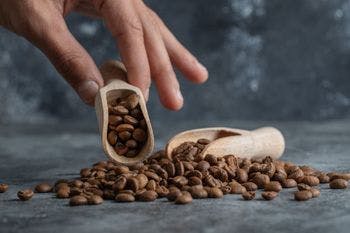
Arabica vs Robusta Beans: Key Differences

Whether you're new to the fascinating world of coffee or have been drinking the rich, smooth drink for years, you've probably seen the words Arabica or Robusta on your bag of beans. And if you're being completely honest, you'll admit that you have no clue what that means.
Well, there are thousands of distinct types of coffee beans, and they all look the same once they've been roasted. But when it comes to your daily cup, there are actually only two that count: Arabica and Robusta.
These two coffee varieties are the most common ones used for brewing beverages. However, despite their prevalence, most individuals are unaware of their differences.
Don't worry; we have figured it out for you. Today, we'll discuss the specifics that set these beans apart and how you can tell which one to brew for your next cup of coffee.
What is arabica coffee?

Arabica accounts for more than 60% of the world's coffee production today. Yes, that's true! It yields a significantly wider range of flavours because of its complex acidity and flavour compounds and is typically sweeter and packed with fruity and nutty aromas.
Generally, it costs more than Robusta since it's considerably more fragile and picky about its environment, preferring cooler temperatures and higher altitudes. Arabica coffee beans are larger than Robusta beans and more elongated in shape, typically with a prominent crease down the centre.
So the next time you see it you know that’s Arabica!
What is robusta coffee?

On the other hand, robusta coffee beans are relatively smaller, and rounder and have a harsher flavour and a bitter taste than arabica beans. Since they have less oil, they usually taste more natural and earthy. These beans make up around 25% of the world's coffee production and are often cheaper than arabica beans.
Arabica vs. Robusta: The Differences
Taste
Arabica has a naturally sweeter and more pleasant taste than Robusta. Its pleasant floral and fruity aromas make it a popular choice amongst coffee lovers. On the other hand, Robusta is known for its woody, earthy, and even burnt-rubber-like flavour profile.
Caffeine content
Robusta beans have a caffeine concentration of 2.7%, which is significantly higher than the 1.5% found in arabica beans. These beans are ideal for people who need a strong caffeine boost first thing in the morning.
Sugar content
Arabica coffee has almost twice the amount of sugar as Robusta coffee. So now it all makes sense why Robusta coffee tastes so bitter and why most of us prefer grabbing Arabica.
Cultivation
Robusta coffee beans come from a pet-resilient plant that can be cultivated at low altitudes of 200–800 meters. Arabica coffee beans, on the other hand, are fragile and can only be grown in subtropical regions that are mildly cool.
They call for plenty of moisture, nutrient-dense soil, partial shade, and adequate sunshine. Quite demanding, right?
Price
Arabica coffee is much more costly than Robusta since it needs more effort and resources to cultivate the Arabica coffee plant.
So who wins in the end, Arabica or Robusta?
Most coffee connoisseurs think that Arabica coffee is superior to Robusta coffee. However, this is largely a subjective thing. While this may be true, it does not change Robusta's role in the coffee industry. There is a distinct niche for both of these varieties of coffee beans.
Robusta beans work well in blends that are used to make iced coffee, espresso, and milk-based coffees. Arabica beans are excellent for pour-over and drip coffees, accentuating their rich flavour profiles.
We hope you find your new favourite bean and brew some exquisite coffee with all the brainstorming you had around these two popular beans.

I am a coffee aficionado based in Seattle. I have devoted my passion and expertise to perfecting the art of home coffee brewing. I became known for my exquisite pour-over and espresso creations. I source coffee beans from local roasters and explores ...



